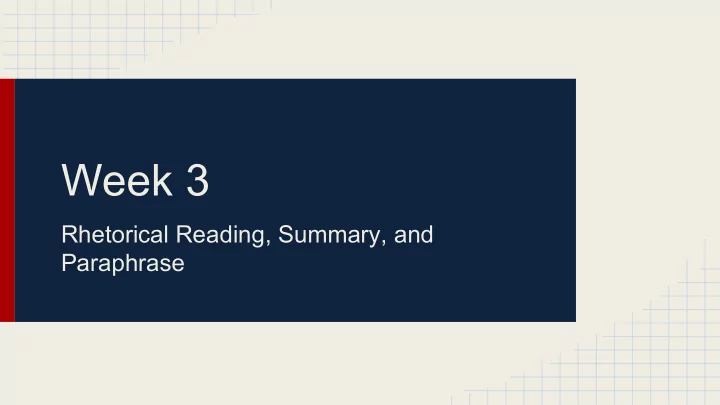

Week 3 Rhetorical Reading, Summary, and Paraphrase
Some ads to consider, No. 1
No. 2
No. 3
Summarizing
From IMDB: Forrest Gump, while not intelligent, has accidentally been present at many historic moments, but his true love, Jenny Curran, eludes him. (Website summary) A man with a low I.Q. has accomplished great things in his life and been present during significant historic events - in each case, far exceeding what anyone imagined he could do. Yet, despite all the things he has attained, his one true love eludes him. "Forrest Gump" is the story of a man who rose above his challenges, and who proved that determination, courage, and love are more important than ability. (User “summary”) Vs. The story follows the life of low I.Q. Forrest Gump and his meeting with the love of his life Jenny Curran. The film chronicles his accidental experiences with some of the most important people and events in America from the late 1950s through the 1970s including a meeting with Elvis Presley, JFK, Lyndon Johnson, Richard Nixon, fighting in Vietnam, etc. The problem is, he's too stupid to realize the significance of his actions. Forrest becomes representative of the baby boomer generation having walked through life blindly. (User “summary”) Emergency slide in case of video mishap
Summarizing Useful because: ● It helps you organize your reading of an article and reduce it the most important parts ● It helps you set up arguments based on large amounts of text in a smaller space when you begin to conduct rhetorical analysis Always includes: ● Main points viewed in light of the author’s message or theme ● Primarily your own words, but sometimes the authors when necessary (and then the author’s words are in quotations) Should not include: ● Your interpretation or opinion (at this stage in the process)
Paraphrasing Useful because: ● It allows you to restate an author’s message in language that makes sense to you ● You as an author and reader can present another author’s words in a certain way that suits your rhetorical analysis (while still doing so accurately) Always includes: ● The original ideas expressed in your own language Should not include: ● Your own opinion or interpretation
BA 2 Description, Part One, Article Summary The following four articles are located in Ch. 16 of your textbook. To complete your article summary, select one of the articles from the list below. Your summary of an article should follow the summary writing guidelines discussed in Section 12f 3. Articles to summarize (all from First-Year Writing): ● “The New Sovereignty,” Shelby Steele 450 ● “My Pedagogic Creed,” John Dewey 46 ● “The American Scholar,” Ralph Waldo Emerson 468 Description, Part Two, Paraphrase Assignment After you’ve completed your summary, you will paraphrase a brief but complex passage from the same text. Your goal in this assignment is to restate the ideas of the passage in your own words and do so in a way that is readable and understandable. To complete this assignment, choose a passage from the provided list (from the same article you summarized) and paraphrase that passage. Identify the page number and paragraph number of the original passage (i.e. p. 205, paragraph 1) above your paraphrase so that your instructor can easily see the changes you have made to express the ideas of the passage in your own words.
Additional BA2 Instructions For the Paraphrase portion (Part 2), you will choose one of these passages to paraphrase: ● Steele – paragraph 26 (“In a liberal democracy…”) ● Dewey – paragraph 5 (“With the advent of democracy…”) ● Emerson – paragraph 14 (“Yet hence arises a grave mischief.” Make sure that the passage you choose to paraphrase is from the same essay you choose to summarize. In other words, pick one essay to work with throughout the BA2.
Additional Homework Reading: ● First-Year Writing Ch. 4 pp. 67-97 ( Expect reading quiz on 9/15 ) ● St. Martin's Handbook: Chapter 7, "Reading Critically" "Reading and Writing about Text" (available in the final part of the handbook, "WID/Critical Reading Skills") ● Audio Lesson: Rhetorical Choices *If you have not read all 3 articles from Chapter 16, do so! Blog: Submit a short post (200-250 words) that: 1. Gives your name, classification, major, and one memorable fact about you. 2. Identifies the article that you will (tentatively) be working with for the semester (Steele, Dewey, or Emerson) 3. Explains why you chose that article. Be specific: did it appeal to your experiences, to your sense of ethics, to your emotions? (“It was shorter than the others” or “It’s the only one I read” are not acceptable answers, even if they’re true.)
Recommend
More recommend